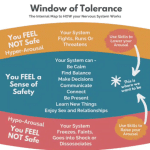
How to do Better with Stress
December 15, 2022
New year. Same you. Now what?
January 5, 2023Regaining a sense of safety and normalcy is essential to supporting and maintaining an individual’s mental health after high-stress and potentially traumatizing events. Critical Incident Stress Debriefing (CISD) is an intervention that consists of a step-by-step assessment, diagnosis, and treatment process and moreover can be seen as small group psychological first aid. Although CISD is not recommended for all situations and individuals, the CISD process may promote resiliency and recovery.
It is recommended that if CISD is to be used, it must occur within 24 – 72 hours thereafter the incident to provide the most support. This means the most acute stage has passed, but involvement is complete. Furthermore, it is intended to provide a safe and non-judgmental space for individuals to process traumatic or stressful events. This usually takes the form of group sessions and may occur more than once.
What Does CISD Look Like?
In these sessions, facilitators help individuals understand their emotional and physical reactions and provide tools and resources for continued support. The sessions generally consist of seven steps.
- The introduction of CISD and individuals and assessing the event’s impact on the individual.
- Focus on facts, identifying issues affecting the individual’s sense of safety within an overview.
- Provide an open and safe space for individuals to share thoughts, emotions, reactions and experiences of the event and validation.
- Explore potential future reactions, issues and concerns, and validation.
- Explore symptoms and review an individual’s stress responses and potentially maladaptive responses to the incident.
- Teach participants about trauma reactions and provide explanations, provide information and resources for further support.
- The closure allows individuals to ask final questions and explore further support options.
As stated above, CISD can be viewed as a group component for the remediation of stressful incidents and may provide relief for some individuals. For more information or to book an appointment, Contact Us – please call 250-718-9291 or email us at [email protected]
Resources
Critical Incident Stress Debriefing: Helpful, Harmful, or Neither? (2019). Journal of Emergency Nursing, 45(6), 611–612. https://doi.org/10.1016/j.jen.2019.08.006
Mitchell, J.T. & Everly, G.S., Jr. (2001). Critical Incident Stress Management: Basic Group Crisis Interventions. Ellicott City, MD: International Critical Incident Stress Foundation
Tuckey, M. R., & Scott, J. E. (2014). Group critical incident stress debriefing with emergency services personnel: A randomized controlled trial. Anxiety, Stress, & Coping, 27(1), 38–54. https://doi.org/10.1080/10615806.2013.809421
Leonard, R., & Alison, L. (1999), Critical incident stress debriefing and its effects on coping strategies and anger in a sample of Australian police offcers involved in shooting incidents. Work & Stress, 13(2), 144-161
Smith, Mary M., (2022), Critical incident stress debriefing: An integrated review. Doctoral Dissertations and Projects. 3483. https://digitalcommons.liberty.edu/doctoral/3483

Written by: Olivia Donaher, MACP
To book: Click Here





